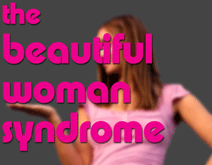Beauty breeding discontentment
Professor Barry Schwartz wrote a must-read book (The Paradox of Choice: Why More Is Less) in which he showed that more choice can paradoxically lead to more anxiety, more confusion, more self-doubt, more buyer's remorse, and ultimately less happiness and satisfaction that the choice was the right choice. This phenomenon also applies to partner selection.
That seems odd, doesn't it? Isn't it preferable to have more choices, so one can select the best possible match? Some choice is indeed good, but too much choice is not. Consider the anguish experienced by very attractive women who place personal ads on Internet dating sites. Such women can receive upwards of 600 responses per week per site. If the fox posts her profile on a few different sites, as many people do, she could be inundated with 10,000 men per month who ardently wish to meet her. Isn't that an enviable position to be in?
No, and here's why. Even if that gorgeous woman did nothing but eat, sleep, and participate in online dating, she could not possibly read all of her messages and engage in the sort of dialogue that is essential for choosing the best possible partner. Someone who might have been her ideal match could easily be overlooked in that mountain of replies. She knows that, too, unless she has the IQ of a rubber plant. Once she chooses someone, she can still be tormented by the fact that she could have obtained a more desirable man by waiting.
Skeptical? Do the math and analyze the statistics yourself. Let's say that the hottie posted her profile on one site only and removed it after receiving 700 responses the first week (based on a true story, by the way). In that pool of 700 men, some are bound to be attractive, intelligent, and interesting millionaires who are nice guys that share many of her interests. She picks one, and they begin dating. Even if things go swimmingly, she wouldn't be human if she never considered dating someone else. If an average person dumped his or her partner hoping to get a better match, that hope might not be realized. A different partner, sure, but a better one? More attractive? More successful? More intelligent, interesting, kind, generous, thoughtful, and attentive? Maybe, but maybe not. Statistically, that person isn't going to have the luxury of choosing from thousands of potential mates. With a limited selection pool, that next partner might be better. Or worse. It happens all the time.
Things are different for the stop-and-stare women who have their pick of the litter. No matter whom she chooses from that group of 700 respondents, it is statistically inevitable that by expanding the pool—say, to 10,000 men—that she could find one who is more attractive, more intelligent, more interesting, and richer, to boot. Game over? Not yet. If she held out for a year and then had over 100,000 potential suitors, she could likely find an “even better” man. And on and on.
Fueling this quest for an even better partner is a conviction that she deserves the best, that nothing is too good for her, because she is beautiful. That belief is quite prevalent in beautiful women, and it is one of the factors underlying the beautiful woman syndrome. Sometimes the search for someone better ends only when age begins to take its toll and her beauty starts to fade.
Thus, for all that very attractive women have, the one thing they often lack is a sense of contentment with their partner selection. The #1 Rule of Dating is, “Find the best possible partner.” However, very attractive women often cannot do that because there are too many men to choose from. Choose one, and there's always someone even better just around the corner. A stunning woman will have an endless stream of men lining up to date her if she is single, or to steal her away from her husband if she is not. She could have the personality of Attila the Hun, less education than a barnyard dog, and many men would still jump at the chance to be with her.
One needn't have 700 admirers to be plagued by an excess of choice. Anyone who watches ABC-TV's The Bachelor or The Bachelorette knows that even 25 simultaneous suitors is too many to intelligently choose from. Increasing the number of possible choices decreases the amount you can learn about each person; there are, after all, only 24 hours in a day. Having to make life-changing decisions without knowing all the relevant facts and thoroughly considering all the available options is a recipe for being perpetually tormented by your choice. So is more choice always better? No.
Consequently, very attractive women often go through life never being totally content. She wants more, she thinks she deserves more, and yet the laws of statistics and the limitations of time conspire to ensure that whomever she chooses is not the best one she could hope for.
Related page: The unknown curse of beauty

Narcissism: the secret sauce of self-delusion
Glamorous ESPN reporter exemplifies BWS nastiness
“Most beautiful dumb girls think they are smart and get away with it, because other people, on the whole, aren't much smarter.”
— Louise Brooks
The Attractive Expert Syndrome • Contact Us • Submit a BWS story
Copyright © 2005 - 2025 bwsyndrome.com and its owner • Terms and Conditions of Use